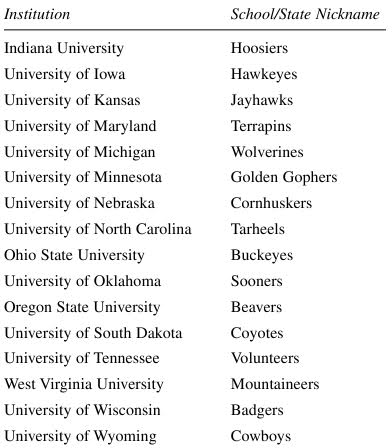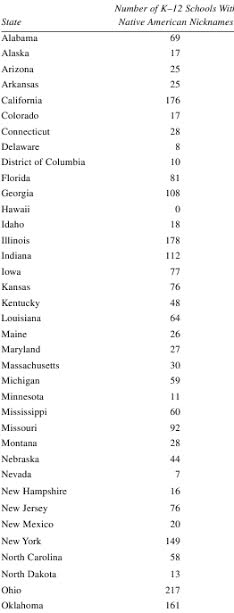In the sports world, a mascot is a person, animal, or object that serves as a symbol of an athletic team. Schools at all levels, from elementary schools to universities, assign mascots and nicknames to their athletic teams. A mascot is important to a school because fans and supporters of a school’s athletic teams often identify with the school’s mascot or nickname. Mascots often arouse emotion among current and former students, as well as other supporters of a school’s teams. Schools and colleges have a large variety of mascots and nicknames, including colors, animals, people, and other objects. Some mascots are representative of a school’s town or state. Others were voted on by the student body. Some mascots and nicknames have been deemed offensive to Native Americans. This entry examines sports mascots in schools across all levels of education, discussing the most common mascots, why they are important to schools, and the controversy over Native American mascots.
What They Are
The term mascot is often used interchangeably with the terms nickname and logo. However, the terms do have distinct meanings. A mascot is a tangible object, usually a person or an animal, that is adopted by a school, college, or other organization to represent its athletic teams. The person or animal that serves as a mascot is often seen on the sideline or in the stands at athletic events and pep rallies. A nickname is simply the name that is used to represent an athletic team, and a logo is a picture or a symbol that represents the team.
School and college mascots and nicknames often go beyond identification of an athletic team. For better or worse, mascots often become the identification of the entire school or institution, not just of its athletic teams. It is via a mascot or a nickname that current students, past students, prospective students, and others outside the academic community sometimes view the school. With the attention that athletics receives in the media, a mascot or nickname is often the most common identification outsiders have with a particular school.
Derivation Of Names
The origin of high school and college mascots and/or nicknames is often an interesting story, although it is sometimes difficult to trace. Some school or college archives do provide a detailed account of how a nickname was chosen. The history behind the nicknames of some schools, however, is not very clear. Thus, officials and supporters of some schools and colleges can only speculate as to how their school’s nickname was chosen, and the origin will forever remain a legend.
Some school and college mascots have been in existence for more than a century. Many high school nicknames have historic meaning to their town or community. Likewise, some college nicknames have meaning to the community, region, or state. Some nicknames speak to an institution’s heritage, or mission, such as the nickname “Aggies” at some agricultural and mechanical (A&M) colleges or land-grant universities.
Maintaining a symbolic connection between an institution and its state is often especially important for public universities that are the flagship institutions for their state. As such, several state flagship (or secondary flagship) institutions’ athletic nicknames resemble or match the state’s nickname. Table 1 lists examples of such institutions that adopted their state’s official or unofficial nickname as their own.
Having a nickname or mascot that matches the state’s nickname is not the only way that a school or college can maintain a connection to its region or state. Many school nicknames and mascots are those of animals that were once common to the geographic region of the school. Animals, whether indigenous to a region or not, are the most common choice for nicknames and mascots in schools at all levels. Table 2 lists the most popular nicknames among four-year colleges in the United States, including institutions across all divisions of the National Collegiate Athletic Association (NCAA) and the National Association for Intercollegiate Athletics (NAIA).
Table 1. Public University Nicknames That

Although Table 2 lists the most popular nicknames at the college level, a list of the most popular elementary and high school nicknames would look similar, with various animals topping the list. Some educational institutions, however, have American Indian nicknames and mascots that represent their athletic teams. The use of American Indian nicknames, mascots, and logos has been controversial for many years, and the issue has received a great deal of attention more recently.
Native American Issues
In 2001, the U.S. Commission on Civil Rights declared that American Indian nicknames and mascots were “inappropriate” and “disrespectful” in colleges and should be eliminated. The NCAA soon began to investigate the issue, and in 2005 identified thirty-one NCAA-member institutions that use American Indian nicknames, mascots, or logos deemed to be “hostile” or “abusive.” The institutions were asked to specify how they use such imagery and their reasons for doing so. The list of offending institutions was pared to eighteen after their reports to the NCAA.
Table 2. Most Popular Nicknames Among U.S. Four-Year Colleges (NCAA all divisions and NAIA)
Late in 2005, the NCAA made a landmark and controversial decision to ban racially or ethnically derogatory imagery from postseason events. The decision meant that the eighteen offending institutions would have to cover Indian references on their uniforms at NCAA postseason playoffs or tournaments, and those institutions would be banned from hosting any NCAA playoffs or tournaments until the offending imagery was changed.
Table 3.
Schools at the K–12 Level in Each State That Use Native American Nicknames and Mascots Several of the eighteen schools remaining on the list of offenders made appeals to the NCAA in an effort to keep their name or mascot.

Five institutions won their appeal, based on the fact that they had the approval of a local namesake Native American tribe:
- Catawba College Indians, Catawba Indian Nation of North Carolina
- Central Michigan University Chippewas, Saginaw Chippewa Indian Tribe of Michigan
- Florida State University Seminoles, Seminole Tribe of Florida
- Mississippi College Choctaws, Mississippi Band of Choctaw Indians
- University of Utah Utes, Northern Ute Indian Tribe of Utah
Some of the eighteen institutions lost consecutive appeals and are faced with the decision of switching the name or facing the proposed sanctions. Finally, five institutions decided to switch their nickname and/or mascot as a result of the negative publicity and proposed sanctions:
- Carthage College (WI) Redmen became Red Men and changed logo
- Chowan College (NC) Braves became Hawks
- Midwestern State University (TX) Indians became Mustangs
- Southeastern Oklahoma State University Savages became Savage Storm
- University of Louisiana at Monroe Indians became Warhawks
Those opposed to the use of American Indian nicknames and mascots claim that such imagery promotes racial stereotypes. They suggest that the rituals and chants that mascots and fans perform during games (such as the “tomahawk chop”) are offensive and trivialize some items or traditions that are sacred to Native Americans. Supporters of such nicknames claim that they are honoring and celebrating Native American culture. Many supporters of the nicknames also suggest that the NCAA does not have the authority to regulate the choice of nicknames and mascots at individual institutions and is imposing social policy. Many also cite the NCAA as imposing on university autonomy and academic freedom.
The issue of Native American mascots has monopolized significant amounts of time for many college presidents and trustees. Colleges are often hesitant to change their nickname or mascot for fear of backlash from alumni in the form of decreased donations. The issue has also received the attention of lawmakers at both the state and national level. In Florida, Governor Jeb Bush applauded the NCAA’s decision to allow Florida State University to keep its Seminoles nickname with the support of the Seminole Tribe of Florida.
In North Dakota, the state Board of Education ruled in 2001 that the University of North Dakota’s athletic teams must be known as the “Fighting Sioux.” State officials voted in June 2006 to sue the NCAA for penalizing UND. Lawmakers from other states where college nicknames and mascots have caused controversy introduced legislation to Congress that would limit the NCAA’s authority over the issue. The bill would permit colleges to sue the NCAA if it punishes the schools. Rep. Tim Johnson (R-IL) and the Speaker of the U.S. House of Representatives, Dennis Hastert, introduced legislation designed to prevent the NCAA from invading institutional autonomy.
The controversy over Native American nicknames and mascots is not only at the college level. There are currently hundreds of elementary and high schools across the country that use such nicknames or mascots, including names such as Indians, Warriors, Braves, Chiefs, Redskins, and Savages. Table 3 lists, by state, the number of schools at the K–12 level that have Native American nicknames.
Bibliography:
- Lessiter, M. (1989). The college names of the games: The stories behind the nicknames of 293 college sports teams. Chicago: Contemporary Books.
- American Indian Sports Team Mascots: http://www.aistm.org
- National Collegiate Athletic Association Hall of Champions: http://www.ncaa.org/hall_of_champions/global/nicknames/ nickname_list.htm
This example Sports Mascots Essay is published for educational and informational purposes only. If you need a custom essay or research paper on this topic please use our writing services. EssayEmpire.com offers reliable custom essay writing services that can help you to receive high grades and impress your professors with the quality of each essay or research paper you hand in.




